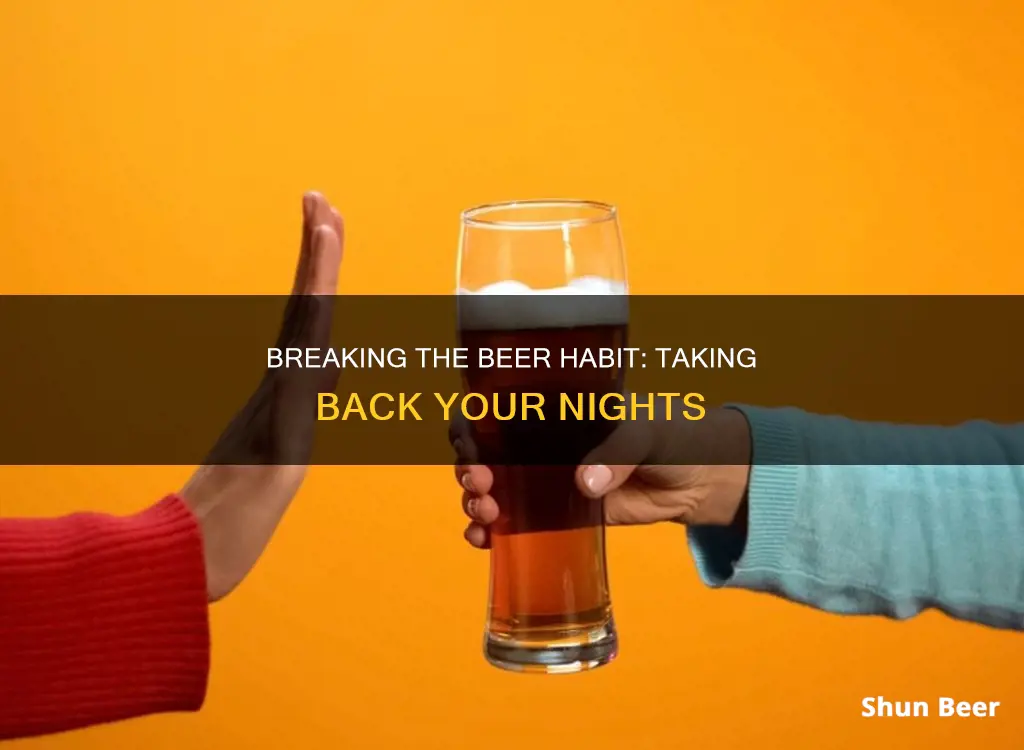
Drinking alcohol every night can lead to a dangerous addiction, with severe health consequences. Alcoholism is a physical and mental compulsion to consume alcohol, and it's important to recognise the signs and get help. The first step is acknowledging that you have a problem, and then seeking support from trained professionals. There are also some simple strategies you can implement yourself to reduce your dependence, such as setting achievable goals, understanding your triggers, and making a conscious decision to cut down or quit. Changing your drinking habits can be challenging, but it's a positive step towards a happier and healthier life.
| Characteristics | Values |
|---|---|
| Recognise the problem | Alcohol is highly addictive and can cause serious damage to health. |
| Set goals | Set realistic, achievable goals with specific time frames. |
| Understand triggers | Identify people, situations or environments that trigger drinking. |
| Build a support system | Inform trusted friends and family, join support groups, and seek professional help if needed. |
| Change routine | Plan alcohol-free days, change social habits, and find alternative activities and hobbies. |
| Practice self-care | Exercise, meditate, eat well, and improve sleep habits. |
| Be persistent | Changing drinking habits takes time and effort; don't give up if you slip up. |
What You'll Learn

Set achievable goals and write down your reasons for stopping
Setting achievable goals and writing down your reasons for wanting to stop drinking beer every night are crucial steps in your journey towards reducing your alcohol consumption. Here are some detailed instructions and considerations to help you through this process:
Set Achievable Goals:
- Start with realistic expectations and time frames: Recognise that quitting alcohol cold turkey can be challenging and even dangerous. Set realistic and achievable goals that are specific, measurable, and timely. For example, you could gradually reduce the number of beers you drink each night or set specific alcohol-free days.
- Set a daily limit: Instead of focusing solely on the long-term goal, break it down into smaller, manageable targets. For instance, you could start by limiting yourself to a certain number of drinks per day. The federal government's Dietary Guidelines for Americans recommend that men should not exceed two drinks per day, and women should not exceed one drink per day.
- Choose alcohol-free days: Decide on specific days when you will abstain from drinking. This can be a gradual process; you could start with two or three alcohol-free days per week and gradually increase the number.
- Stick to your limit: Once you have set your daily or weekly limit, make a commitment to stick to it. This discipline will help you achieve your overall goal of reducing your beer consumption.
Write Down Your Reasons:
- Identify your "why": Reflect on and write down the reasons why you want to stop drinking beer every night. Are you seeking improved relationships, better health, weight loss, or clearer skin? Keeping these reasons visible will serve as a constant reminder and boost your motivation during challenging times.
- Understand your triggers: Reflect on the people, places, or situations that trigger your drinking. Is it a particular group of friends, work stress, or financial worries? Understanding these triggers will help you develop strategies to cope with cravings and make positive changes.
- Journal your thoughts and feelings: Writing down your thoughts and feelings in a journal can help you understand your drinking patterns, identify your pain points, and address the underlying reasons for your drinking. It can also be a rewarding way to track your progress and see how far you've come.
- Visualise the benefits: Write down the positive outcomes you expect from reducing your beer consumption. For example, you may experience better sleep, improved mood, clearer skin, and even weight loss. Keeping these potential benefits in mind will motivate you to stay on track.
Is Root Beer Safe for Children to Drink?
You may want to see also

Understand your triggers and develop strategies to cope
Understanding your triggers is a great way to reduce your drinking. It could be a particular set of friends, work stress, financial worries, or simply a certain time of day. Once you identify them, you can work out how to get past them and create new habits. For example, you could plan a different activity for when you finish work, like going for a run, or have an alternative non-alcoholic 'treat' ready to enjoy.
If you're doing a grocery shop, just buy enough alcohol for a specific occasion to help stick to your drink-free goals and save money. This will also stop you from having a surplus of alcohol at home. If you usually pop into the pub after work, change your normal route home. Or try a different pub that offers some alcohol-free drinks. Once you've broken that routine, you'll probably find you won't need to even think about it or plan ahead.
Finding things to distract you from drinking is a great way to deal with any potential urges. It can also help to have some quick solutions at hand. Here are some ideas:
- Make time to catch up with a friend
- Listen to a podcast
- Make a snack or a mocktail
- Enjoy the outdoors—even if it's just going for a walk
- Try some calming activities like meditating or breathing exercises, or download a relaxation app to help you unwind after a long day
- Be productive—try ticking off some of those life admin tasks you're always too busy for, like DIY or decluttering
- Set yourself a challenge—you might find it motivating to set yourself a long-term goal to work towards on the days you're not drinking
It's important to reach out to people you know and explain that you're struggling with alcohol addiction. Knowing that someone else is looking out for you can make it easier to cope in stressful situations when you're likely to be tempted by alcohol. If you live with a partner, it's especially important that they're on board to help.
- Remind yourself of your reasons for making a change. Carry your top reasons on a wallet card or in an electronic message that you can access easily, such as on your phone or a saved email.
- Talk it through with someone you trust. Have a trusted friend on standby for a phone call, or bring one along for support in situations where you might be tempted to drink.
- Distract yourself with a healthy, alternative activity. For different situations, come up with engaging short, mid-range, and longer options, like texting or calling someone, watching short online videos, lifting weights to music, showering, meditating, taking a walk, or doing a hobby.
- Challenge the thought that drives the urge. Stop it, analyze the error in it, and replace it. For example, "It couldn't hurt to have one little drink. WAIT a minute—what am I thinking? One could hurt, as I've seen 'just one' lead to lots more. I am sticking with my choice not to drink."
- Ride out the urge without giving in. Instead of fighting it, accept it as normal and temporary. As you ride it out, keep in mind that it will soon crest like an ocean wave and pass.
Beer Coolers: Understanding the Science of Cold
You may want to see also

Plan ahead and break your routine
Planning ahead and breaking your routine is a great strategy to stop drinking beer every night. Here are some detailed tips to help you implement this strategy effectively:
Identify your triggers
Think about what triggers your nightly drinking. It could be something like finishing work, putting the kids to bed, or a certain time of day. Once you've identified your triggers, you can work on ways to get past them and create new habits. For example, if you usually pop into the pub after work, change your route home or try going for a run instead.
Plan alcohol-free days
Decide in advance which days you won't drink alcohol, and spread them out as evenly as possible. Mark these non-drinking days on a calendar or your smartphone. This will help you stay accountable and make it easier to plan fun alcohol-free activities. Start with two or three alcohol-free days a week and gradually increase the number as you get more comfortable.
Distract yourself
Find activities to distract yourself from drinking. Make plans to catch up with friends, listen to a podcast, make a snack or a mocktail, or spend time outdoors. Try calming activities like meditation or breathing exercises, or download a relaxation app to help you unwind. Set yourself a challenge or a long-term goal to work towards on your non-drinking days.
Change your environment
Remove alcohol from your house to avoid temptation. If you're doing a grocery shop, only buy alcohol for a specific occasion to stick to your drink-free goals and save money. Try going to pubs or bars that offer alcohol-free drinks, or check out alcohol-free bars.
Be prepared for cravings
Cravings can be intense but usually only last a few minutes. Have a plan to distract yourself when cravings strike. Eat small meals throughout the day to keep your blood sugar balanced, as hunger can trigger cravings. Practice deep breathing to help you manage the physical symptoms of anxiety and stress, which can also trigger cravings.
Remember, it's okay to slip up sometimes. Breaking a nightly drinking habit takes time and practice, so don't be too hard on yourself if you have setbacks. Keep trying, and you'll eventually break free from the cycle of nightly drinking.
Beer After Laparoscopic Gastrectomy: What You Should Know
You may want to see also

Drink slowly and space out drinks with non-alcoholic beverages
Drinking beer every night can quickly add up to a large number of units over the course of a week. It is recommended that you do not drink more than 14 units of alcohol per week to keep health risks low. Drinking less will also positively impact your mood, skin, and energy levels.
If you are drinking every night, it is likely that your body has developed a physical and psychological reliance on alcohol. You may feel agitated, jittery, or unable to sleep when you drink less. This is a sign that your body has developed a dependence on alcohol.
To address this, you can try drinking more slowly and spacing out your drinks with non-alcoholic beverages. This will help you to reduce the quantity of alcohol you are consuming and slow the development of tolerance.
- Sip your drink: Take your time and savour your beer. By drinking more slowly, you will consume less alcohol overall.
- Alternate alcoholic and non-alcoholic drinks: Try having a glass of water, soda, or juice between each beer. This will help to hydrate you and slow down your consumption of alcohol.
- Avoid drinking on an empty stomach: Always have something to eat before drinking alcohol. This will help to slow down the absorption of alcohol into your bloodstream.
- Choose lower-strength beer: Opt for lower-alcohol options when available. This will reduce the amount of alcohol you are consuming without changing your drinking habits too drastically.
- Practice mindfulness: Try to be mindful of your drinking habits and the amount you are consuming. This can help you to make more conscious choices about your drinking.
- Set a limit: Decide on a specific number of drinks you will allow yourself and stick to it. This will help you to maintain control over your drinking.
- Have alcohol-free days: Try to incorporate a few drink-free days into your week. This will help to reduce your overall alcohol consumption and give your body a break from processing alcohol.
Remember, it is always a good idea to consult with your doctor if you are concerned about your drinking habits. They can provide advice and guidance tailored to your specific situation.
Non-alcoholic Beer: Safe or Risky for People in Recovery?
You may want to see also

Seek support from friends, family, and professionals
Seeking support from friends, family, and professionals is a crucial step in reducing your alcohol intake. It can be challenging to make lifestyle changes on your own, and having a strong support system in place can increase your chances of success. Here are some ways to seek support and get the help you need:
Friends and Family:
- Educate your support system: Help your friends and family understand your goals and why you are making these changes. Explain the reasons behind your decision to reduce your drinking, and ask for their encouragement and assistance.
- Be specific with your requests: Let your support system know exactly how they can help you. For example, ask them not to offer you alcohol, not to drink around you, and to provide words of encouragement without criticism.
- Join a support group: Consider joining a support group, such as Al-Anon, which is specifically designed for friends and family members of people struggling with alcohol. These groups can provide you with additional tools and resources to support your loved one effectively.
- Avoid enabling behaviour: While it's important to be supportive, avoid enabling behaviours that shield your loved one from the consequences of their drinking. This includes hiding or disposing of alcohol, taking over their responsibilities, or offering financial assistance due to their drinking. Instead, hold them accountable for their behaviour and help them maintain their sense of dignity.
Professionals:
- Seek professional help: Consider reaching out to a licensed therapist or counsellor who specialises in addiction. They can provide you with additional tools and strategies to manage your drinking habits and offer ongoing support throughout your journey.
- Call a helpline: If you feel comfortable, call a helpline, such as SAMHSA's National Helpline (1-800-662-HELP), to get confidential advice and referrals to local treatment facilities, support groups, and community-based organisations.
- Visit your doctor: Speak to your doctor about your concerns. They can help you decide whether it's best to cut back or abstain completely, and they can provide referrals to appropriate treatment programs.
Remember, it's okay to ask for help. By seeking support from friends, family, and professionals, you are taking a crucial step towards achieving your goals and improving your well-being.
Beer and Zoloft: What You Need to Know
You may want to see also
Frequently asked questions
The first step is to recognise that you have a problem with alcohol. It's important to set achievable goals and understand your triggers. Friends and family can be a part of the solution, so consider reaching out to them for support.
Work in some drink-free days, change up your routine, and find distractions. Keep a diary of your drinking and set a limit on how much you will drink.
With less alcohol in your system, you're likely to experience clearer skin, better sleep, and an overall boost in your mood. You may also lose weight and reduce your risk of long-term health problems like liver and heart disease, as well as several cancers.







